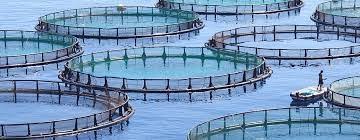Don’t Cage Our Oceans
Groups Calls Out Trump for using COVID19 as Cover to Undercut Fishing Communities and Push Ocean Factory Fish Farms

On Thursday May 7, 2020, amid the ongoing COVID-19 crisis, the White House issued a controversial Executive Order to streamline permitting for industrial marine finfish farms and gut other protective regulatory processes for managing ocean wildlife and habitat. The move threatens wild ecosystems, local fishing communities and coastal economies, and paints the fish farming industry as a whole in a bad light.
The Executive Order on Promoting American Seafood Competitiveness and Economic Growth mandates federal agencies to craft a program for rapid authorization of factory fish farm facilities, which use giant floating cages to cultivate finfish, causing a wider range of ecological and economic problems. The E.O. follows Rep. Collin Peterson’s introduction of the similarly-intended AQUAA Act (H.R. 6191) in the House.
Marianne Cufone, Executive Director of the Recirculating Farms Coalition said, “It’s just stunning that our Administration is behaving this way amid a global crisis. Rather than focusing on supporting local food suppliers, like fishing and farming families, the White House is trying to short-cut proper lawmaking processes to push through outdated and unnecessary methods of industrial fish farming.”
The Recirculating Farms Coalition promotes appropriately-scaled, local, sustainable fish farming that works with, not undermines, fishing communities.
Commercial and recreational fishing groups, conservation organizations, chefs and food justice groups all have pushed back over many years, against the development of marine finfish aquaculture in the U.S. Yet, the National Oceanic and Atmospheric Administration (NOAA), the very federal agency tasked with protecting and managing ocean resources, has repeatedly wasted hundreds of thousands of taxpayer dollars in promoting this outdated and unnecessary industry. The agency has tried every mechanism possible to fast-track permitting for finfish farms and failed repeatedly. This Executive Order is a final, desperate, attempt to do an end-run around Congressional authority and public opposition.
Globally, offshore aquaculture has been associated with a litany of problems – from fish escapes and pollution to habitat damage. So much so, many countries, like Canada and Denmark, once fish farming proponents, are moving away from the industry to more sustainable practices. Given the current state of the world, with people struggling to stay healthy and unemployment rising significantly, introducing a new industry that could further devastate the food supplies and put more people out of work by destroying fisheries makes no sense.
Not so coincidentally, the Administration made another announcement today – that it is providing $300 million in a stimulus package to U.S. fisheries. The funds will be controlled by NOAA too – meaning if fishermen complain about the new EO, that could harm their businesses, there could be serious repercussion limiting access to the new stimulus funds.
All of this smacks of executive overreach, and unabashedly attempting to push through unpopular decisions while the world is busy dealing with a major crisis. None of this is flattering to our government, and rightfully will certainly be the topic of legal and political challenges soon.
*
Note to readers: please click the share buttons above or below. Forward this article to your email lists. Crosspost on your blog site, internet forums. etc.
Featured image is from the author

